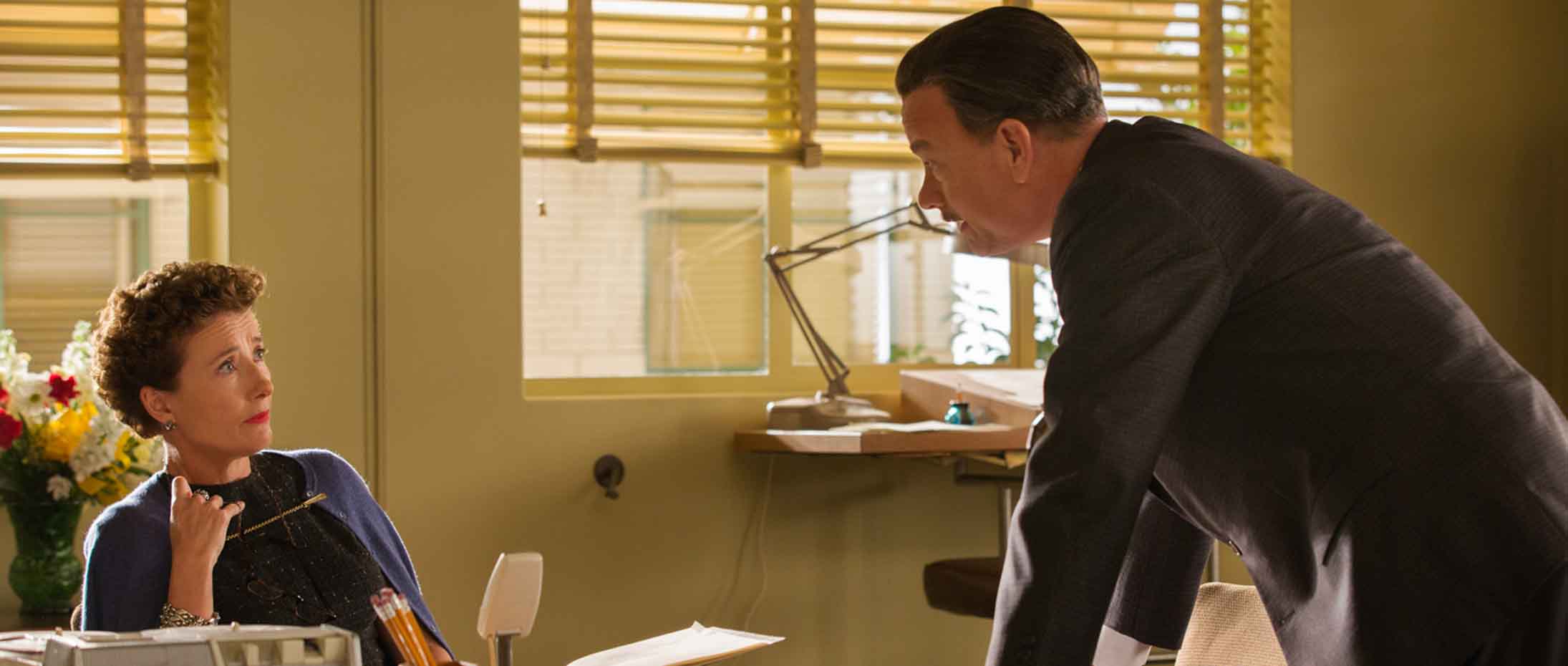Emma Thompson gives a performance for the ages in Saving Mr. Banks, the new picture chronicling Walt Disney’s pursuit of humorless Mary Poppins author P.L. Travers, who in 1961 traveled from London to Hollywood to entertain signing away the film rights to her deeply personal story. On the surface, director John Lee Hancock’s film is a classic fish-out-of-water comedy about a stubborn, stuffy British matron who will eventually warm to the joys of the Disney machine. But underneath it is something quite different, and more compelling—an examination of the healing power of art to reconcile the past and present.
It’s 1961 London and author Pamela Travers (Thompson), pursued by Disney for some twenty years to sell the rights to her famous character, finds herself broke. On the advice of her agent, she’s soon on a plane to sunny California (which she despises, sight unseen) to meet the Walt Disney himself, played with real charm by Tom Hanks, who to her chagrin insists on calling her “Pam.” She’s adamantly opposed to all things Hollywood, intent on sheltering her beloved creation from the likes of dancing penguins and instantly dismissive upon meeting screenwriter Don DaGradi (Bradley Whitford) and musicians and lyricists Robert (B.J. Novak) and Richard (Jason Schwartzman) Sherman. One of the film’s many pleasures is watching the trio develop the songs under Travers’ watchful eye, historically accurate as the closing credits reveal.
The first part of the picture is a breezy lark, Travers disagreeing with all things Hollywood, railing against everything from the sunlight to the menagerie of stuffed animals Disney supplies for her hotel room. Her stuffy prig routine is a hoot, and Thompson runs comic miles here, decimating every well-meaning studio rep while slowly bonding with her driver, very well played by Paul Giamatti.
But when Travers actually joins the Mary Poppins production process, the Disney team pulls out all the stops to overcome her chilliness and something unexpected happens as Travers finds herself revisiting a painful childhood and locked-away memories of a painful youth.
Gorgeously shot in widescreen by cinematographer John Schwartzman, the picture shuttles between the candy-colored studio pastels of 1961 (Disney’s studio offices have been perfectly preserved in vintage décor to this day) to the difficult early 20th century childhood of Travers, raised in Australia by a failed, drunken father (the superb Colin Farrell) whom she idolized, and the nanny (Rachel Griffiths) who played a key role in her own personal formation and artistic reinvention many years later.
Saving Mr. Banks has been maligned by some cynics as being a sugary, innocuous piffle, or misguided tale of an artist swallowed up by the corporate machine. How wrong they are. Make no mistake—this is a first-class, involving character study that works on a number of narrative and thematic levels. Marcel and Smith expertly balance historical details, culture-clash farce, both Hollywood satire and loving paean to Disney, backstage production details (the creation of Mary Poppins’ music and lyrics get center stage) and ultimately a story about two adults—initially adversaries—coming to terms with the past. Late in the picture Disney makes an unexpected trip to London for final visit with Travers, and Hanks delivers a revealing monologue about Disney’s upbringing that makes clear his motivations for family-friendly optimism.
At the center of this smoothly carpentered picture is a major piece of acting from Thompson, in full power of her magnificently expressive face, running the gamut of tragicomic notes. She plays Travers repressed in spite of herself, and the beauty of this acting is that Thompson sells every tiny moment, every gradual opening, every caustic aside, every sad reflection—then lets all of it go, culminating in a final sequence merger of art and life, childhood and adulthood, that is simply magical.
Her final scenes, set at the lavish Mary Poppins premiere, are sublime—she watches her adolescence unfold onscreen, and all of her reserves fall away.
So do ours.
4 stars.



